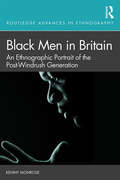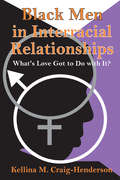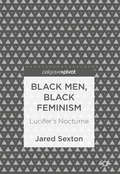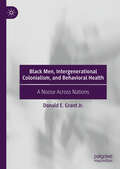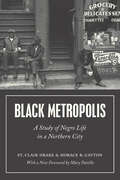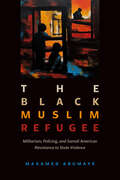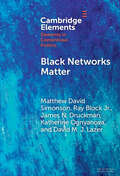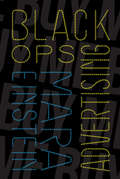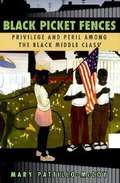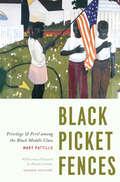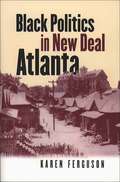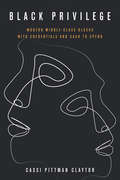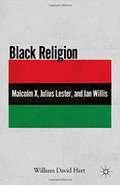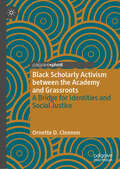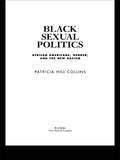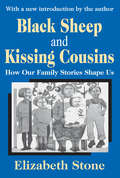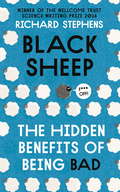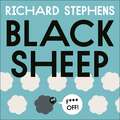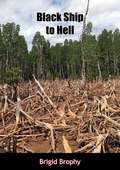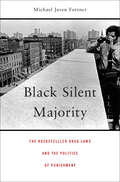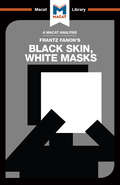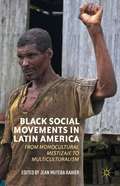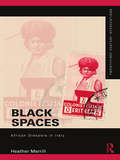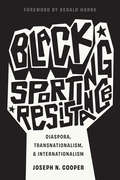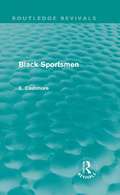- Table View
- List View
Black Men in Britain: An Ethnographic Portrait of the Post-Windrush Generation (Routledge Advances in Ethnography)
by Kenny MonroseWhile extensive attention has been paid to black youth, adult black British men are a notable omission in academic literature. This book is the first attempt to understand one of Britain’s hidden populations: the post-Windrush generation, who matured within a post-industrial British society that rendered them both invisible and irrelevant. Using ethnography, participant observation, interviews and his own personal experience, and without an ounce of liberal angst, Kenny Monrose pulls no punches and presents the reader with a fierce but sensitive study of a population that has been vilified and ignored. The widely disseminated portrait of black maleness, which habitually constructs black men as being either violently dangerous, or social failures, is challenged by granting black men in Britain the autonomy to speak on sociologically significant issues candidly and openly for themselves. This reveals how this group has been forced to negotiate a glut of political shifts and socially imposed imperatives, ranging from Windrush to Brexit, and how these have had an impact on their life course. This provides a cultural uplift and offers an authenticated examination and privileged insight of black British culture. This book will be of interest to sociologists, cultural historians and criminologists engaged with citizenship, migration, race, racialisation and criminal justice.
Black Men in Interracial Relationships: What's Love Got to Do with It?
by Kellina Craig-HendersonWhy is it that successful black men--black men who are "at the top of their game" in the arts, entertainment, politics and athletics--are four times as apt to be married to or dating a woman who is not an African American than they were only thirty years ago? And why are twice as many black men involved in interracial relationships as black women? In addition to their celebrity status, which includes widespread popularity and wealth, black men from Charles Barkley to James Earl Jones to Russell Simmons to Bryant Gumbel share something else in common; something that also characterizes the experiences of more than 250,000 less well-known black men in the United States. They happen to be involved in interracial intimate relationships.Less than fifty years ago such relationships were next to impossible, leading to severe social sanctions. The fact that this is no longer the case is concrete evidence of changes in the quality and character of contemporary race relations. Drawing on her own observations, and her examination of the responses of a small, diverse group of black men who date (in some cases exclusively), have sexual relations with, and marry women who are not of African descent, the book provides insight into the continuing ways that race and ethnic status affect the choices people make in their lives. Until this book, though, these types of relationships have received scant serious attention. Craig-Henderson forthrightly addresses the taboo, interspersing analysis with verbatim accounts from black men involved in such relationships.Grounded in serious research, interviews, and analysis of census data, Black Men in Interracial Relationships examines why such relationships appear to be so popular among black male elites. In the process, the author unravels the mystery behind the apparent absence of black women in black men's lives. It will be of interest to specialists in race, gender, family, and sexual issues, and appropriate for courses in these areas. It is also highly readable and thought-provoking for the general public, who will find its observations and findings fascinating.
Black Men, Black Feminism: Lucifer's Nocturne
by Jared SextonA brief commentary on the necessity and the impossibility of black men’s participation in the development of black feminist theory and politics, Black Men, Black Feminism examines the basic assumptions that have guided—and misguided—black men’s efforts to take up black feminism. Offering a rejoinder to the contemporary study of black men and masculinity in the twenty-first century, Jared Sexton interrogates some of the most common intellectual postures of black men writing about black feminism, ultimately departing from the prevailing discourse on progressive black masculinities. Sexton examines, by contrast, black men’s critical and creative work—from Charles Burnett’s Killer of Sheep to Jordan Peele’s Get Out— to describe the cultural logic that provides a limited moral impetus to the quest for black male feminism and that might, if reconfigured, prompt an ethical response of an entirely different order.
Black Men, Intergenerational Colonialism, and Behavioral Health: A Noose Across Nations
by Donald E. Grant Jr.This book provides an in-depth historical exploration of the risk and protective factors that generate disproportionality in the psychological wellness, somatic health, and general safety of Black men in four industrialized Euronormative nations. It provides a detailed analysis of how nationalism, globalism, colonialism, and imperialism have facilitated practices, philosophies, and policies to support the development and maintenance of inter-generational systems of oppression for Black men and boys. The text juxtaposes empirically-supported constructs like historical trauma and epigenetics with current outcomes for Black men in the US, the UK, France and Canada. It details how contemporary institutions, practices, and policies (such as psychological testing, the school to prison pipeline, and over-incarceration) are reiterations of historic ones (such as convict leasing, debt peonage, and the Jim Crow laws). The text uses paleontological, archaeological, and anthropological research to cover over 200,000 years of history. It closes with strength-based paradigms aimed to dismantle oppressive structures, support the post-traumatic growth of Black men and boys, and enhance the systems and practitioners that serve them.
Black Metropolis: A Study of Negro Life in a Northern City
by Horace R. Cayton St. Clair DrakeGround-breaking when first published in 1945, Black Metropolis remains a landmark study of race and urban life. Few studies since have been able to match its scope and magnitude, offering one of the most comprehensive looks at black life in America. Based on research conducted by Works Progress Administration field workers, it is a sweeping historical and sociological account of the people of Chicago's South Side from the 1840s through the 1930s. Its findings offer a comprehensive analysis of black migration, settlement, community structure, and black-white race relations in the first half of the twentieth century. It offers a dizzying and dynamic world filled with captivating people and startling revelations. A new foreword from sociologist Mary Pattillo places the study in modern context, updating the story with the current state of black communities in Chicago and the larger United States and exploring what this means for the future. As the country continues to struggle with race and our treatment of black lives, Black Metropolis continues to be a powerful contribution to the conversation.
Black Muslim Refugee: Militarism, Policing, and Somali American Resistance to State Violence (Critical Refugee Studies)
by Maxamed AbumayeThis multisited project, the first of its kind, exposes the links between US military violence abroad and police brutality at home through a profound exploration of Somali refugee lives. Black Muslim Refugee traces the globe-spanning journeys of these refugees, from civil war–era Somalia to the Dadaab refugee camp in Kenya to their eventual arrival in San Diego, and Maxamed Abumaye analyzes their experiences through the dual lenses of anti-Blackness and Islamophobia. He situates their displacement within the larger context of East Africa's colonial history, as well as the policy consequences of the American-backed war on terror and war on drugs. Throughout, Abumaye's centering of Somali subjectivity underlines this community's critical and creative capacity to defy the mechanisms that seek to "manage" and ultimately control them.
Black Networks Matter: The Role of Interracial Contact and Social Media in the 2020 Black Lives Matter Protests (Elements in Contentious Politics)
by Matthew David Simonson Ray Block Jr James N. Druckman Katherine Ognyanova David M. LazerScholars have long recognized that interpersonal networks play a role in mobilizing social movements. Yet, many questions remain. This Element addresses these questions by theorizing about three dimensions of ties: emotionally strong or weak, movement insider or outsider, and ingroup or cross-cleavage. The survey data on the 2020 Black Lives Matter protests show that weak and cross-cleavage ties among outsiders enabled the movement to evolve from a small provocation into a massive national mobilization. In particular, the authors find that Black people mobilized one another through social media and spurred their non-Black friends to protest by sharing their personal encounters with racism. These results depart from the established literature regarding the civil rights movement that emphasizes strong, movement-internal, and racially homogenous ties. The networks that mobilize appear to have changed in the social media era. This title is also available as Open Access on Cambridge Core.
Black Ops Advertising: Native Ads, Content Marketing and the Covert World of the Digital Sell
by Mara EinsteinFrom Facebook to Talking Points Memo to the New York Times, often what looks like fact-based journalism is not. It's advertising. Not only are ads indistinguishable from reporting, the Internet we rely on for news, opinions and even impartial sales content is now the ultimate corporate tool. Reader beware: content without a corporate sponsor lurking behind it is rare indeed.Black Ops Advertising dissects this rapid rise of "sponsored content," a strategy whereby advertisers have become publishers and publishers create advertising-all under the guise of unbiased information. Covert selling, mostly in the form of native advertising and content marketing, has so blurred the lines between editorial content and marketing message that it is next to impossible to tell real news from paid endorsements. In the 21st century, instead of telling us to buy, buy, BUY, marketers "engage" with us so that we share, share, SHARE-the ultimate subtle sell.Why should this concern us? Because personal data, personal relationships, and our very identities are being repackaged in pursuit of corporate profits. Because tracking and manipulation of data make "likes" and tweets and followers the currency of importance, rather than scientific achievement or artistic talent or information the electorate needs to fully function in a democracy. And because we are being manipulated to spend time with technology, to interact with "friends," to always be on, even when it is to our physical and mental detriment.
Black Picket Fences: Privilege and Peril Among the Black Middle Class
by Mary Pattillo-Mccoy"Black Picket Fences" is a stark, moving, and candid look at a section of America that is too often ignored by both scholars and the media: the black middle class. The result of living for three years in "Groveland," a black middle-class neighborhood on Chicago's South Side, sociologist Mary Pattillo-McCoy has written a book that explores both the advantages and the boundaries that exist for members of the black middle class. Despite arguments that race no longer matters, Pattillo-McCoy shows a different reality, one where black and white middle classes remain separate and unequal.
Black Picket Fences: Privilege and Peril among the Black Middle Class
by Mary PattilloBlack Picket Fences is a stark, moving, and candid look at a section of America that is too often ignored by both scholars and the media: the black middle class. The result of living for three years in "Groveland," a black middle-class neighborhood on Chicago's South Side, sociologist Mary Pattillo-McCoy has written a book that explores both the advantages and the boundaries that exist for members of the black middle class. Despite arguments that race no longer matters, Pattillo-McCoy shows a different reality, one where black and white middle classes remain separate and unequal. "An insightful look at the socio-economic experiences of the black middle class. . . . Through the prism of a South Side Chicago neighborhood, the author shows the distinctly different reality middle-class blacks face as opposed to middle-class whites. " —Ebony "A detailed and well-written account of one neighborhood's struggle to remain a haven of stability and prosperity in the midst of the cyclone that is the American economy. " —Emerge
Black Politics in New Deal Atlanta
by Karen FergusonWhen Franklin Roosevelt was elected president in 1932, Atlanta had the South's largest population of college-educated African Americans. The dictates of Jim Crow meant that these men and women were almost entirely excluded from public life, but as Karen Ferguson demonstrates, Roosevelt's New Deal opened unprecedented opportunities for black Atlantans struggling to achieve full citizenship. Black reformers, often working within federal agencies as social workers and administrators, saw the inclusion of African Americans in New Deal social welfare programs as a chance to prepare black Atlantans to take their rightful place in the political and social mainstream. They also worked to build a constituency they could mobilize for civil rights, in the process facilitating a shift from elite reform to the mass mobilization that marked the postwar black freedom struggle. Although these reformers' efforts were an essential prelude to civil rights activism, Ferguson argues that they also had lasting negative repercussions, embedded as they were in the politics of respectability. By attempting to impose bourgeois behavioral standards on the black community, elite reformers stratified it into those they determined deserving to participate in federal social welfare programs and those they consigned to remain at the margins of civic life.
Black Privilege: Modern Middle-Class Blacks with Credentials and Cash to Spend (Culture and Economic Life)
by Cassi Pittman ClaytorIn their own words, the subjects of this book present a rich portrait of the modern black middle-class, examining how cultural consumption is a critical tool for enjoying material comforts as well as challenging racism. New York City has the largest population of black Americans out of any metropolitan area in the United States. It is home to a steadily rising number of socio-economically privileged blacks. In Black Privilege Cassi Pittman Claytor examines how this economically advantaged group experiences privilege, having credentials that grant them access to elite spaces and resources with which they can purchase luxuries, while still confronting persistent anti-black bias and racial stigma. Drawing on the everyday experiences of black middle-class individuals, Pittman Claytor offers vivid accounts of their consumer experiences and cultural flexibility in the places where they live, work, and play. Whether it is the majority white Wall Street firm where they're employed, or the majority black Baptist church where they worship, questions of class and racial identity are equally on their minds. They navigate divergent social worlds that demand, at times, middle-class sensibilities, pedigree, and cultural acumen; and at other times pride in and connection with other blacks. Rich qualitative data and original analysis help account for this special kind of privilege and the entitlements it affords—materially in terms of the things they consume, as well as symbolically, as they strive to be unapologetically black in a society where a racial consumer hierarchy prevails.
Black Religion: Malcolm X, Julius Lester, and Jan Willis
by William David HartThis book explores the spiritual dimensions (political, racial, sexual, and violent) of Malcolm X's journey from Christianity to Islam, Julius Lester's journey from Christianity to Judaism, and Jan Willis's journey from Christianity to Buddhism.
Black Scholarly Activism between the Academy and Grassroots: A Bridge for Identities and Social Justice
by Ornette D. ClennonThis book explores the 'invisible' impact whiteness has on the lived 'black' experience in the UK. Using education as a philosophical and ethical framework, the author interrogates the vision of Black Radicalism proposed by Kehinde Andrews, exploring its potential applicability to grassroots activism. Clennon uses an interdisciplinary theoretical framework to draw together his previous writings on 'blackness', in effect crystallising the links between commercial (urban) blackness, the pathological structures of whiteness and institutional control. Drawing inspiration from Robbie Shilliam's cosmologically related 'hinterlands' as an antidote to the nature of colonial (Eurocentric) epistemologies, the author uses the polemical chapters as gateways to theoretical discussion about the material effects of whiteness felt on the ground. This controversial and unflinching volume will be of interest to students and scholars of race studies, particularly within education, and the lived black experience.
Black Sexual Politics: African Americans, Gender, and the New Racism
by Patricia Hill CollinsIn Black Sexual Politics, one of America's most influential writers on race and gender explores how images of Black sexuality have been used to maintain the color line and how they threaten to spread a new brand of racism around the world today.
Black Sheep and Kissing Cousins: How Our Family Stories Shape Us
by Elizabeth StoneWhen someone says, at a holiday dinner table, "Oh, those Lawrence cousins lose control all the time," or "the Davises always had more talent than luck," you can be sure there's a lesson being passed along, from one generation to another. Who tells stories to whom and about what is never a random matter. Our family stories have a secret power: they play a unique role in shaping our identity, our sense of our place in the world. The give us values, inspirations, warnings, incentives. We need them. We use them. We keep them. They reverberate throughout our lives, affecting our choices in love, work, friendship, and lifestyle. Elizabeth Stone, whose grandparents came from Italy to Brooklyn, artfully weaves her own family stories among the stories of more than a hundred people of all backgrounds, ages, and regions - clarifying for us predictable types of family legends, providing ways to interpret our own stories and their roles in our lives. She examines stories of birth, death, work, money, romantic adventure - all in the context of the family storytelling ritual. And she shows how stories about our most ancient ancestors may provide answers at milestone moments in our lives, as well as how stories about our newest family members carve out places for them so they will fit into their families, comfortably or otherwise. Upon its initial publication in 1988, Studs Terkel said that the book is "A wholly original approach to an ancient theme: family storytelling and its lasting mark on the individual." Judy Collins noted that "Elizabeth Stone's marvelous book on family myths and fables is irresistible. It lets us in on our own secrets in a provocative and exciting way." And Maggie Scarf wrote, "What a clever topic, and how beautifully Elizabeth Stone has written about it! I recommend Black Sheep and Kissing Cousins for everyone who has ever been raised in a family."
Black Sheep: The Hidden Benefits of Being Bad
by Dr Richard StephensRichard Stephens became the focus of international media attention in 2009 for his research on the psychological benefits of swearing as a response to pain. Now, fresh from winning the 2014 Wellcome Trust Science Writing Prize, Richard's first popular science book uncovers other pieces of surprising and occasionally bizarre scientific enquiry showing that what we at first perceive as bad can, in fact, be good.More pub conversation than science book, Richard's writing style is very accessible - both engaging and humorous. Think wasting time is bad? Not always! Research shows that taking time out can help you solve difficult problems. And if you can't be bothered tidying up, well fine, research shows that people are more creative in a messy environment. Swearing is rude but research shows that in some situations it can be a form of politeness. Swearing can also be used as a tool of persuasion.Black Sheep casts a slant on a range of human experiences from life to death, sex to romance, from speed thrills to halting boredom and from drinking alcohol (in moderation) to headily excessive bad language. This is a fascinating left-field tour of the world of psychological science. Get ready for the many hidden benefits of being bad that you really won't have seen coming.
Black Sheep: The Hidden Benefits of Being Bad
by Dr Richard StephensFrom the man who won the Wellcome Trust Science Writing Prize 2014 and married a human statue comes a book of weird and wonderful psychological science from the far-flung corners of human experience.Who knew that having sex can reduce stress, or a cheeky whisky could give you the edge at charades? Is it really true that people who are smart swear more and that dropping the F-bomb makes great pain relief?'Richard Stephens demonstrates that the bad ("NEVER DO THAT!") things in life do have their good, practical side' Marc Abrahams, founder of the Ig Nobel Prize 'A genial and knowledgeable guide to everyday vices from alcohol to chewing gum, which finds that there are often hidden virtues to be found in them, too' Michael Regnier, Science Writer/Editor at the Wellcome TrustRichard Stephens became the focus of international media attention in 2009 for his research on the psychological benefits of swearing as a response to pain. Now, fresh from winning the 2014 Wellcome Trust Science Writing Prize, Richard's first popular science book uncovers other pieces of surprising and occasionally bizarre scientific enquiry showing that what we at first perceive as bad can, in fact, be good.More pub conversation than science book, Richard's writing style is very accessible - both engaging and humorous. Think wasting time is bad? Not always! Research shows that taking time out can help you solve difficult problems. And if you can't be bothered tidying up, well fine, research shows that people are more creative in a messy environment. Swearing is rude but research shows that in some situations it can be a form of politeness. Swearing can also be used as a tool of persuasion.Black Sheep casts a slant on a range of human experiences from life to death, sex to romance, from speed thrills to halting boredom and from drinking alcohol (in moderation) to headily excessive bad language. This is a fascinating left-field tour of the world of psychological science. Get ready for the many hidden benefits of being bad that you really won't have seen coming.(P)2018 Hodder & Stoughton Limited
Black Ship to Hell
by Brigid BrophyIs modern man threatening to destroy his world? First published in 1962, this book, which analyzes the origins, history, and manifestations of the destructive impulse that exists in human beings, has relevance and interest for all of us. The author sees this impulse as primarily one of self-destruction deflected outward, and her brilliant exploration of its multiple effects takes her and the reader into regions of complex fascination.In ranging the fields of art, science, and morality for evidence to support her contentions, Miss Brophy not only reveals herself as a writer of immense cultivation and power, but also as a provocative thinker. Her basic conclusion—that the philosopher, the teacher, the psychologist, and the artist, among others, in order to be productive or even operative, must acknowledge and allow for the instinctual sources of behavior, which Freud so daringly illuminated and documented—is expressed in lively, passionate prose.This is a highly controversial book that will undoubtedly rouse storms of argument, for the issues, like the outcome, are of the deepest concern to us all. Miss Brophy’s opponents, if they are to make themselves heard, must at least match her in intellectual caliber and cultural equipment.
Black Silent Majority: The Rockefeller Drug Laws and the Politics of Punishment
by Michael Javen FortnerCurrent anti-drug policies are based on a set of controversial laws first adopted in New York in the early 1970s and championed by the state’s Republican governor, Nelson Rockefeller. Fortner traces how many blacks in New York came to believe that the rehabilitation-focused liberal policies of the 1960s had failed. Faced with economic malaise and rising rates of addiction and crime, they blamed addicts and pushers. By 1973, the outcry from grassroots activists and civic leaders in Harlem calling for drastic measures presented Rockefeller with a welcome opportunity to crack down on crime and boost his political career. New York became the first state to mandate long prison sentences for selling or possessing narcotics. Black Silent Majority lays bare the tangled roots of a pernicious system. America’s drug policies, while in part a manifestation of the conservative movement, are also a product of black America’s confrontation with crime and chaos in its own neighborhoods.
Black Skin, White Masks
by Rachele DiniFrantz Fanon’s explosive Black Skin, White Masks is a merciless exposé of the psychological damage done by colonial rule across the world. Using Fanon’s incisive analytical abilities to expose the consequences of colonialism on the psyches of colonized peoples, it is both a crucial text in post-colonial theory, and a lesson in the power of analytical skills to reveal the realities that hide beneath the surface of things. Fanon was himself part of a colonized nation – Martinique – and grew up with the values and beliefs of French culture imposed upon him, while remaining relegated to an inferior status in society. Qualifying as a psychiatrist in France before working in Algeria (a French colony subject to brutal repression), his own experiences granted him a sharp insight into the psychological problems associated with colonial rule. Like any good analytical thinker, Fanon’s particular skill was in breaking things down and joining dots. His analysis of colonial rule exposed its implicit assumptions – and how they were replicated in colonised populations – allowing Fanon to unpick the hidden reasons behind his own conflicted psychological make up, and those of his patients. Unflinchingly clear-sighted in doing so, Black Skin White Masks remains a shocking read today.
Black Social Movements in Latin America
by Jean Muteba RahierDrawing from a wide spectrum of disciplines, the essays in this collection examine in different national contexts the consequences of the "Latin American multicultural turn" in Afro Latino social movements of the past two decades.
Black Spaces: African Diaspora in Italy (Twenty-First Century INTERVENTIONS)
by Heather MerrillBlack Spaces examines how space and place are racialized, and the impacts on everyday experiences among African Italians, immigrants, and refugees. It explores the deeply intertwined histories of Africa and Europe, and how people of African descent negotiate, contest, and live with anti-blackness in Italy. The vast majority of people crossing the Mediterranean into Europe are from West Africa and the Horn of Africa. Their passage is part of the legacy of Italian and broader European engagement in colonial projects. This largely forgotten history corresponds with an ongoing effort to erase them from the Italian social landscape on arrival. Black Spaces examines these racialized spaces by blending a critical geographical approach to place and space with Afro-Pessimist and critical race perspectives on the lived experiences of Blackness and anti-blackness in Italy."
Black Sporting Resistance: Diaspora, Transnationalism, and Internationalism (Critical Issues in Sport and Society)
by Joseph N. CooperIn recent years, there has been increased attention towards activism in sporting spaces. A vast majority of these contributions have focused on intra-nation tensions and impact. Yet, there is a dearth of scholarship that has engaged in a theoretically grounded analysis of how Black sportspersons have exhibited resistance in and through sport across national borders across time, space, and context. In this text, Joseph N. Cooper introduces the Black Sporting Resistance Framework (BSRF) as an analytic lens to examine how resistance actions in and through sport have contributed to the advancement of local and global racial justice efforts. Key concepts such as African (Black) diaspora, transnationalism, internationalism, sporting resistance typology, and sport activism typology are incorporated throughout the book. Black sporting resistance is also analyzed alongside broader social movements such as the Black Liberation Struggle, Black Nationalism, Pan-Africanism, and Black Radicalism. Insights on the ways in which sport can be used to advance social justice in the future are presented.
Black Sportsmen (Routledge Revivals)
by E. CashmoreFirst published in 1982, Black Sportsmen examines the effect that race has had on sportspeople. The book is based on interviews with a wide range of sportspeople from Olympic athletes to schoolchildren and novices. Written at a time when many black youths were turning to, and succeeding in sports such as athletics, boxing, football, karate and table tennis, this book focuses on the various ways in which black sports competitors reacted to their blackness.
